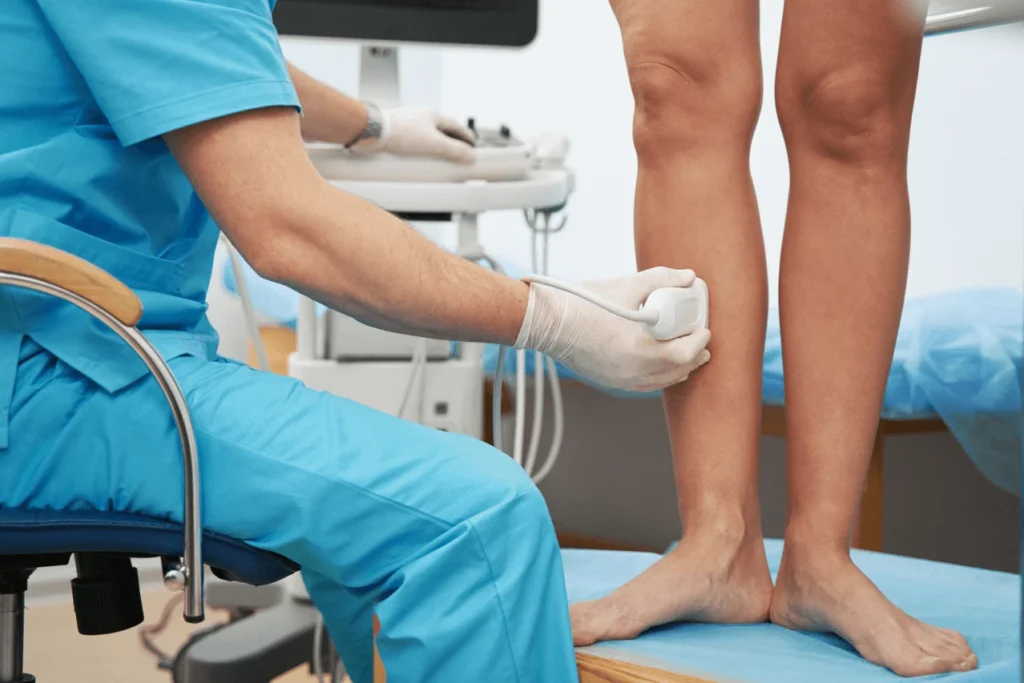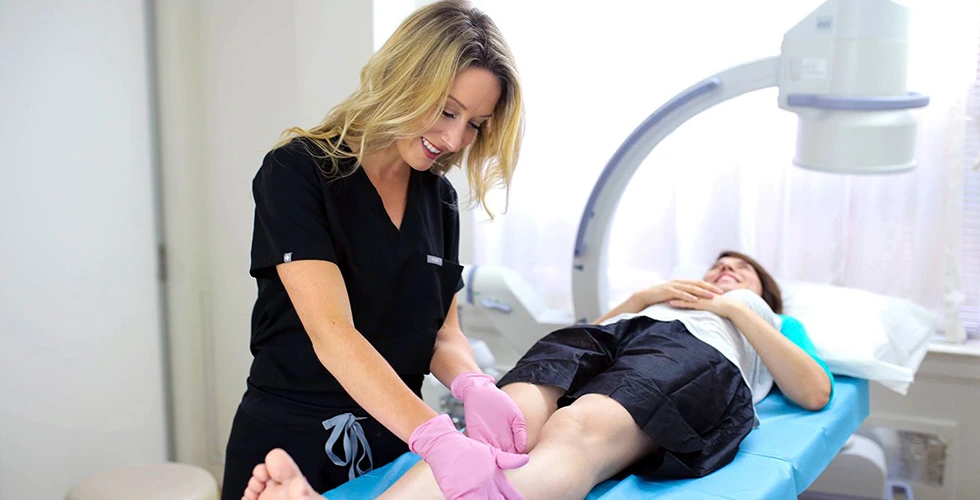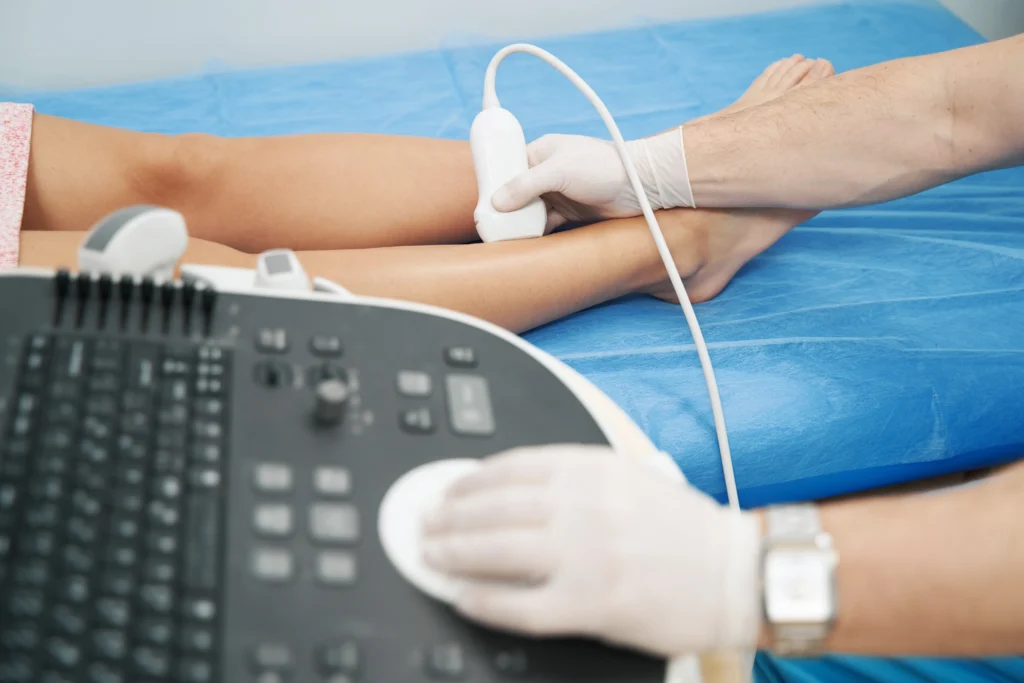If you’re suffering from varicose veins or spider veins, you may be searching for a solution that not only alleviates your discomfort but also provides you with the confidence that you’re in the hands of skilled and caring professionals. At Maryland Vein Clinic, we understand the importance of seeking treatment from experienced and compassionate vein doctors. In this article, we explore why choosing board-certified vein doctors for your vein care is crucial and how our clinic, located at 10215 Fernwood Rd, Suite 301, Bethesda, can help you.

The Assurance of Board Certification
Experienced vein doctors possess a deep understanding of venous diseases and the complexities of the circulatory system. At Maryland Vein Clinic, our vein specialists are board-certified, which means they have undergone rigorous training and have successfully passed examinations to demonstrate their expertise in the field of vein care.
The American Board of Venous and Lymphatic Medicine officially recognizes the country’s top 1% of vein doctors for their contributions to phlebology. To get board-certified by the ABVLM, vein doctors must stay abreast of the latest developments in vein care, complete complex professional milestones like fellowships and residencies, and undergo continuous education. They must also maintain a flawless track record. Maryland Vein Clinic is led by board-certified vein doctors who offer specialized, compassionate vein care.
Reasons to Choose Board-Certified Vein Doctors:
- Advanced knowledge of the circulatory system
- Familiarity with the latest vein treatment technologies
- Higher likelihood of successful treatment outcomes
- Ability to handle complex vein issues
- Commitment to patient safety and well-being
- Compliance with industry standards and best practices
- Dedication to continuous improvement in vein care
- Confidence in their skills and expertise
Personalized Vein Treatment Plans
One of the key advantages of consulting experienced vein doctors is their ability to create personalized treatment plans tailored to your specific needs. At Maryland Vein Clinic, we follow a comprehensive approach that begins with a thorough diagnosis using duplex ultrasound. This diagnostic tool helps us identify the root cause of your vein issues, ensuring that we target the problem at its source.
How Duplex Ultrasound Works
Duplex ultrasound is a non-invasive imaging technique that combines traditional ultrasound with Doppler technology. It works by emitting high-frequency sound waves into the body, which bounce off blood cells and return as echoes. The Doppler effect detects changes in the frequency of these echoes as they interact with moving blood, allowing for the visualization of blood flow direction, speed, and abnormalities in veins. This enables vein doctors to accurately diagnose and assess the severity of venous conditions, guiding personalized treatment plans.
The Importance of Personalized Vein Treatments:
- Tailored approach to individual patient needs
- Increased treatment effectiveness
- Minimization of unnecessary procedures
- Enhanced patient satisfaction
- Improved long-term outcomes
- Reduced risk of complications
- Optimal use of minimally invasive techniques
- Addressing the root causes of vein issues
- Comprehensive and patient-centered care
- Greater likelihood of vein health restoration
Cutting-Edge Minimally Invasive Procedures
The field of vein care has advanced significantly over the years, with a shift towards minimally invasive treatments. In the not-too-distant past, the only way to treat vein disease was through complex surgical procedures like vein ligation and vein stripping. These procedures often involved long incisions and extended downtime. They also involved a higher risk of complications, such as infections and deep vein thrombosis.
In recent years, surgical treatments have become almost obsolete because of the availability of safer, more effective minimally invasive vein treatments. At Maryland Vein Clinic, we specialize in a range of minimally invasive treatments, such as sclerotherapy, endovenous laser ablation, radiofrequency ablation, VenaSeal, ClariVein, and ambulatory phlebectomy. Board-certified vein doctors are skilled in performing these procedures.
Benefits of Minimally Invasive Vein Treatments:
- Minimal discomfort during and after procedures
- Faster recovery and return to daily activities
- Smaller incisions or injections, resulting in less scarring
- Reduced risk of infection compared to open surgery
- Lower chances of complications
- High success rates in treating varicose veins and spider veins
- Enhanced cosmetic outcomes
- Customizable treatment plans for individual needs
- Shorter treatment durations
Excellent Bedside Manners
Excellent bedside manners are a hallmark of quality healthcare. Vein doctors with exemplary bedside manners prioritize patient comfort and communication. They listen attentively to patients’ concerns, provide clear explanations of procedures, and address questions and fears. A compassionate and empathetic approach helps alleviate anxiety and builds trust between the doctor and the patient. Patients who experience excellent bedside manners often have a more positive and comfortable vein care experience.
Benefits of Compassionate Vein Doctors:
- Enhanced patient comfort and trust
- Improved communication and understanding
- Reduced anxiety and fear during treatment
- Better patient compliance with treatment plans
- Greater overall patient satisfaction
- A more positive and empathetic healthcare experience
- Building a strong doctor-patient relationship
- Easier expression of concerns and questions
- Enhanced emotional support throughout the treatment journey
Vein Doctor FAQs
What is a vein doctor, and what do they specialize in?
A vein doctor, also known as a phlebologist, is a medical professional specializing in diagnosing and treating venous diseases, including varicose veins and spider veins. They have expertise in the circulatory system and are trained to provide minimally invasive vein treatments.
Are vein doctors and vascular surgeons the same?
Vein doctors and vascular surgeons have different areas of expertise. While vein doctors focus specifically on venous diseases, vascular surgeons have a broader scope and may treat various vascular conditions, including arterial issues. For vein-related concerns, consulting a vein doctor is often the preferred choice.
Why is it important to choose a board-certified vein doctor?
Board certification signifies that a vein doctor has undergone rigorous training, passed examinations, and continuously participates in educational activities to stay up-to-date with the latest advancements in vein care. Choosing a board-certified vein doctor ensures you receive care from a qualified and committed professional.
What qualifications should I look for in a vein doctor?
When choosing a vein doctor, consider their board certification, experience in the field, patient reviews, and the range of minimally invasive treatments they offer. It’s also essential to select a doctor who listens to your concerns and provides personalized treatment plans.
What can I expect during my initial consultation with a vein doctor?
During your initial consultation, the vein doctor will discuss your medical history, perform a physical examination, and may use diagnostic tools like duplex ultrasound to assess your vein health. They will also take the time to address any questions or concerns you may have.
What are the advantages of minimally invasive vein treatments?
Minimally invasive vein treatments offer several benefits, including shorter recovery times, minimal scarring, reduced discomfort, and a lower risk of complications compared to traditional surgery. These procedures are highly effective and can be performed in an outpatient setting.
Is vein treatment painful, and what is the recovery process like?
Minimally invasive vein treatments are designed to minimize discomfort. You may experience mild discomfort or bruising, but this typically subsides within a few days. Recovery times vary depending on the specific procedure but are generally shorter than traditional surgical methods.
Are vein treatments covered by insurance?
Insurance coverage for vein treatments can vary based on your insurance plan and the medical necessity of the procedure. Some treatments may be covered if they are medically necessary, while others may be considered cosmetic and may not be covered. It’s advisable to check with your insurance provider and consult with your vein doctor to understand your coverage.
Can I continue my daily activities after vein treatment?
In most cases, you can resume your daily activities shortly after minimally invasive vein treatments. Your vein doctor will provide specific post-treatment instructions to ensure a smooth recovery. It’s essential to follow these guidelines to optimize your results.
How long do the results of vein treatment last?
The longevity of results varies depending on the type of treatment and individual factors. Many patients experience long-term relief from varicose veins and spider veins after minimally invasive treatments. However, new vein issues may develop over time, and periodic follow-up visits with your vein doctor may be recommended.
Are there any risks or complications associated with vein treatments?
Minimally invasive vein treatments are generally safe, with a low risk of complications. However, as with any medical procedure, there are potential risks, such as infection, bruising, or discomfort. Your vein doctor will discuss these risks with you during the consultation.
Can I choose my vein treatment, or will the doctor decide for me?
Your vein doctor will recommend the most suitable treatment options based on your specific condition and needs. However, they will work closely with you to ensure that your preferences and concerns are taken into account when developing your personalized treatment plan.
Is it necessary to seek vein treatment for cosmetic concerns?
While many people seek vein treatment for cosmetic reasons, addressing venous issues is not just about aesthetics. Untreated venous conditions can lead to discomfort, pain, and potential complications. Vein treatment can improve both the appearance and overall health of your legs.
What should I expect from the overall vein treatment process?
The vein treatment process typically involves an initial consultation, diagnosis, creation of a personalized treatment plan, the actual procedure, and post-treatment follow-up appointments. Your vein doctor will guide you through each step and ensure that you are informed and comfortable throughout the process.
Visit Maryland Vein Clinics
Convenience matters when seeking medical care. Our vein clinic is conveniently located at 10215 Fernwood Rd, Suite 301, Bethesda, Maryland, just outside of Washington, DC in Silver Spring, Maryland. We also offer free insurance verification before your first appointment. We believe that financial transparency is essential in making informed decisions about your vein care. Through insurance verification, we ensure that you have a clear understanding of your out-of-pocket financial burden before your treatment.
When it comes to your vein health, choosing experienced vein doctors is paramount. Visit us at our convenient location in Bethesda, Maryland, and take the first step towards healthier, more beautiful legs. Your vein health is in expert hands at Maryland Vein Clinic.





